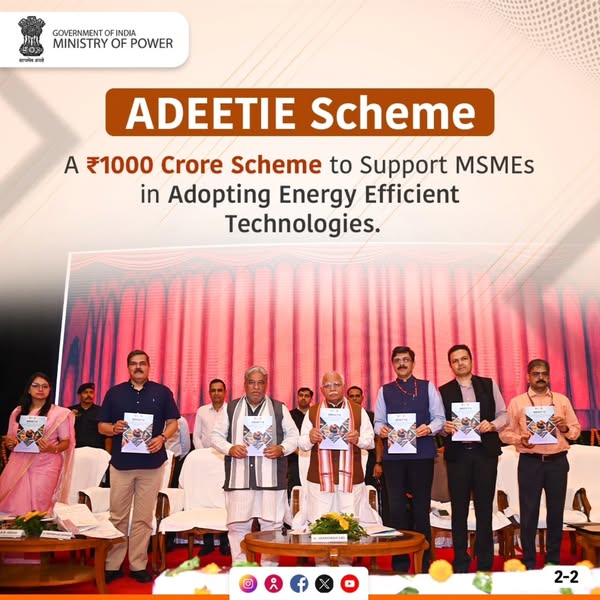ADEETIE Scheme

- 18 Jul 2025
In News:
The Ministry of Power launched the Assistance in Deploying Energy Efficient Technologies in Industries & Establishments (ADEETIE) scheme to promote energy efficiency in Micro, Small, and Medium Enterprises (MSMEs).
Key Details:
- Objective: To reduce energy consumption by 30–50%, enhance the power-to-product ratio, and facilitate the creation of green energy corridors in MSME industrial sectors.
- Implementing Agency:
- o Bureau of Energy Efficiency (BEE), under the Ministry of Power
- o Legislative backing: Energy Conservation Act, 2001
- Duration & Funding
- o Period: FY 2025–26 to 2027–28 (3 years)
- o Budgetary Outlay: ?1000 crore
- Target Beneficiaries
- Eligible Enterprises: MSMEs with Udyam ID
- Must demonstrate a minimum 10% energy savings using implemented technologies
- Sectoral Coverage: Targets 14 energy-intensive sectors, including: Brass, Bricks, Ceramics, Chemicals, Fisheries, Food Processing, etc.
- Implementation Strategy Phased Roll-out:
- Phase 1: 60 industrial clusters
- Phase 2: Additional 100 clusters
Scheme Components
|
Component |
Details |
|
Interest Subvention |
- 5% for Micro & Small Enterprises |
|
Technical Assistance |
- Investment Grade Energy Audits (IGEA) |
|
Financial Support |
- Incentives for adoption of efficient technologies |
Other BEE Initiatives for MSMEs
|
Initiative |
Purpose |
|
BEE-SME Programme |
Promote energy efficiency in MSMEs |
|
National Programme on Energy Efficiency & Technology Upgradation |
Modernize and reduce energy intensity |
|
SIDHIEE Portal |
Digital tool providing energy efficiency insights and handholding support |
Bureau of Energy Efficiency (BEE)
- The Government of India set up the Bureau of Energy Efficiency (BEE) on March 1, 2002 under the provisions of the Energy Conservation Act, 2001.
- The mission of the Bureau of Energy Efficiency is to assist in developing policies and strategies with a thrust on self-regulation and market principles, within the overall framework of the Energy Conservation Act, 2001 with the primary objective of reducing the energy intensity of the Indian economy.
- BEE coordinates with designated consumers, designated agencies and other organizations and recognises, identifies and utilises the existing resources and infrastructure, in performing the functions assigned to it under the Energy Conservation Act.
- The Energy Conservation Act provides for regulatory and promotional functions.
